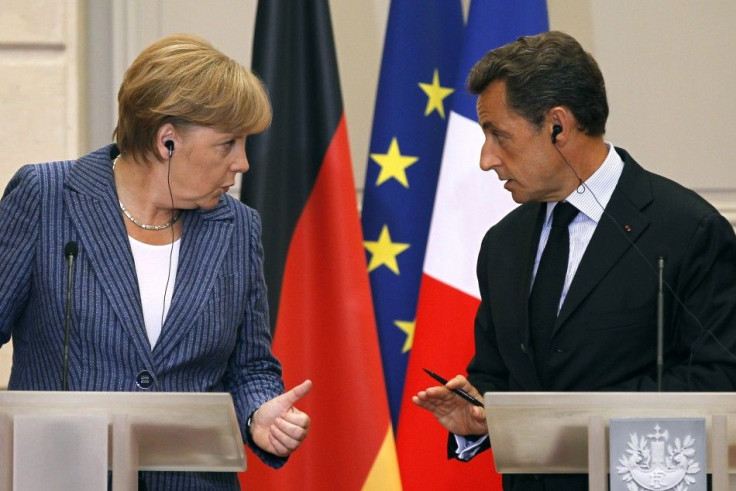France, Germany Agree to Sharply Increase Size of Eurozone Bailout Fund: Report

The leaders of the most powerful nations in Europe, France and Germany, have reportedly agreed to increase the size of the Eurozone’s rescue fund to 2 trillion euros ($2.7 trillion) – up from the current 440 billion euro ($604 billion) lending capability -- as part of comprehensive program to find a solution to the debt crisis wreaking havoc across Europe.
The Guardian newspaper of Britain reported that European Union officials are expected to endorse the fund upgrade this weekend.
France, which has come under recent pressure after Moody’s ratings agency warned it might downgrade the country’s AAA credit rating due to the potential costs of bailing out its banks and other weaker members of the Eurozone, was especially keen to calm market fears.
Earlier, markets shook after it appeared that German officials were skeptical that a long-term, full-scale financial resolution could be arrived at so easily.
However, it appears now some breakthrough has been reached.
The Guardian noted that the Eurozone’s principal bailout fund, the European Financial Stability Facility (EFSF), will not only be larger in size but will also have additional powers to “offer first-loss guarantees for bondholders, be they private or public.”
In essence, the EFSF will become an insurer, and not a bank.
Moreover, senior officials in France and Germany have reached an agreement that European banks need to be recapitalized to achieve a 9 percent capital ratio as demanded by the European Bank Authority (EBA).
In addition, French and German officials are also reportedly near a pact to increase the magnitude of private sector participation in the second proposed bailout package – valued at 109 billion euros -- for ailing Greece.
According to the Guardian, facing the likelihood of a restructuring of Greece’s debt, Germany was seeking losses of up to 50 percent – a plan resisted by France and the European Central bank (ECB), who were considering losses of between 30 percent and 50 percent.
However, Dow Jones in London is refuting the Guardian’s report, citing that Eurozone officials are still discussing the size of the rescue fund and that reports of an agreement to raise the bailout fund to 2 trillion euros is totally wrong, citing an unnamed official.
The DJ article stated: “European officials are working toward resolving the euro zone crisis and will be meeting over the weekend. A report in the Guardian newspaper suggested the EUR440 billion European Financial Stability Facility could be levered up to increase its firepower and the euro surged but EU officials have dismissed the report.”
Leveraging the EFSF is still being debated, an unofficial told DJ. We may have a decision on the size by the summit or just a statement that firepower must be increased. But there no talk about an amount around 2 trillion euros. Such reports of an agreement between France and Germany are totally wrong.
The official added: There will be no deal until Friday when the Eurogroup finance ministers meet. There is indeed a consensus that some form of leverage of the EFSF is desirable to provide the necessary backstops, and the proposal for the EFSF to guarantee first losses at around 20 percent is most likely. However, calculations of the leveraging effect are not simple. The Guardian's approach is too simplistic.
© Copyright IBTimes 2024. All rights reserved.





















